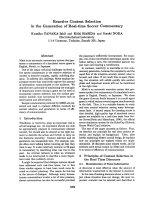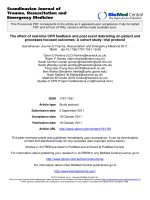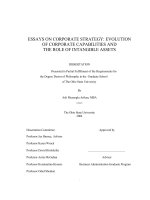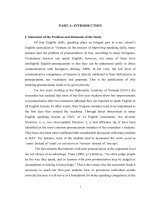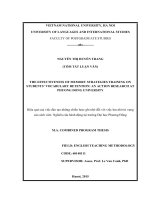Executive summary the ascent of real assets
Bạn đang xem bản rút gọn của tài liệu. Xem và tải ngay bản đầy đủ của tài liệu tại đây (198.04 KB, 2 trang )
FOR INSTITUTIONAL CLIENTS ONLY
THE ASCENT OF REAL ASSETS
Gauging Growth and Goals in Institutional Portfolios
NOVEMBER 2014
Executive summary
Real assets—primarily real estate, infrastructure and commodities—are an
increasing focus of the world’s institutional investors, according to a global survey
of 201 organizations conducted by The EIU. The trend is part of a broader move into
alternative investments by institutions that are seeking to lessen their reliance on
traditional stocks and bonds amid the challenging conditions of the post-crisis years.
Against a backdrop of ultra-low interest rates, sluggish growth and ongoing
uncertainty, nearly half of these investors have increased their allocations to at
least one real asset category in the last three years, and more than half expect to
increase in one or more categories within the next 18 months. They cite two main
drivers for their greater investment: a desire to increase returns and their view of
the macroeconomic environment. Many are also motivated by a need for income.
Other objectives commonly associated with real assets—notably, diversification and
protection against possible inflation—are cited as well, but rank lower.
Investors are using a variety of vehicles and strategies to get exposure to real assets, a
diverse category that also includes timber and farmland. (See box on next page.) Nearly
all respondents (95%) invest in real estate, which has long played a role in institutional
portfolios. Infrastructure, the newest and fastest-growing area, is owned by 65% of the
respondents. Just under one-third of the respondents (29%) invest in commodities.
The median allocation to real assets was 11% of the total portfolio, a percentage that
will rise further if the respondents maintain their current course. Overall, the survey
results signal the continued evolution of real assets as building blocks in institutional
portfolios, with many organizations adding staff to support such effort. However, there
is an important caveat resulting from the same unusual financial conditions that have
been a tailwind for this asset class: A majority of respondents say that a significant rise
in interest rates would cause them to rethink some of their allocations to real assets.
The key findings from the research are as follows:
Real assets have a significant and growing presence in institutional portfolios. Close to
half (46%) of the institutions surveyed have increased allocations in at least one category
in the last three years. In the next 18 months, 60% will increase in at least one category.
Looking within categories, 49% of infrastructure investors, 48% of real estate investors
and 46% of commodities investors expect to increase in the next year and a half.
The need to increase returns is a—if not the—major motivation for adding to
real-asset allocations. In real estate, 63% of investors planning to grow allocations
rank ‘increasing returns’ among the three most important factors in their decision.
The same percentage cite macro-environment considerations, while 38% say a need
for income is a major factor. In infrastructure, 49% of those planning to increase
allocations indicate a desire for returns, with 55% citing the macro environment and
43% referencing a need for income. For those that plan on increasing allocations in
commodities, 70% give returns as a reason.
About the research
In September 2014,
The Economist Intelligence
Unit, on behalf of BlackRock,
conducted a global survey of
201 executives from institutional
investors in 30 countries to
ascertain their level of interest
in and strategies related to
real-asset investment.
In terms of geographic
distribution, 80 respondents
were located in North America,
80 in Europe, the Middle East,
and Africa and 41 in Asia-Pacific.
Approximately one-third of the
organizations represented in
the survey have assets under
management (AUM) of more
than $75bn, with a similar
proportion reporting between
$1bn and $5bn.
As a qualifier, all of the
respondents indicated that they
have significant responsibility
for investment decisions and
that their organization currently
invests in real assets.
WRITTEN BY
Low interest rates are a tailwind for investment in real
assets; a spike in rates could be a headwind. Nearly half
(47%) of survey respondents say low interest rates influence
their investments in real assets. Almost two-thirds (62%) say
they would rethink some of their allocations to real assets
if a ‘significant’ rise in interest rates were to occur. In some
sub-sectors, concerns about lofty valuations are influencing
investment choices.
In infrastructure, equity investments and brownfield projects
are preferred. Among infrastructure investors expecting to
increase allocations, 75% expect to increase equity exposures
and 38% expect to increase debt. Existing (brownfield) projects
are preferred: In developed markets, 51% of those expecting
to increase allocations are at least somewhat interested
in brownfield projects vs 23% that are interested in new
(greenfield) projects.
Many institutions have real-asset teams, and they expect
to add staff to them. Nearly one-third (32%) of respondents
have a real-assets team, sometimes working within a larger
alternatives team. A similar number (30%) plan to increase the
number of employees dedicated to real assets in the next 18
months. Of those without a dedicated real-assets team, 14%
indicate that they will put one in place in the next 18 months.
Nearly all respondents (96%) have staff dedicated to specific
real-asset strategies.
Infrastructure investors express noteworthy interest in
emerging-market opportunities. Investors planning to
increase infrastructure allocations find emerging markets
almost as attractive as developed ones. Nearly half (45%) are
at least somewhat interested in emerging-market brownfield
investments, with 23% interested in emerging-market
greenfield opportunities—the same percentage interested in
new developed-market projects.
In real estate, core equity strategies draw the most interest,
but value-added equity and opportunistic equity also
have appeal. More than half (59%) of investors increasing
allocations to real estate are either somewhat or very
interested in core strategies, which are the most conservative
and income-oriented. Nearly half of those increasing
allocations (47%) express interest in value-added equity, with
34% expressing interest in opportunistic equity strategies—
the highest-risk/highest-return investments.
Most real estate investors have some non-domestic
exposure; a significant minority show strong geographic
diversification. Close to half (44%) of real estate investors
currently have between 1% and 10% of their portfolios
invested outside their domestic markets, compared with 22%
that have more than one-quarter of their portfolio invested
outside their home countries.
Real assets defined
This survey defines real-asset investments as follows:
``
Real Estate: real estate debt; private real estate
equity; public real estate securities (REITS)
``
Infrastructure: debt and equity in hard assets (eg
power plants and toll roads) that generate cash flows
by providing essential services
``
Commodities: exposure to energy, metals or
agricultural products via physical commodities,
natural resource equities or private commingled funds
``
Timber and farmland: also considered to be real
assets, but with relatively few investors owning them,
allocation trends are not explored in depth
In the US this material is for institutional investors only. In the EU issued by BlackRock Investment Management (UK) Limited (authorised and regulated by the Financial Conduct Authority).
Registered office: 12 Throgmorton Avenue, London, EC2N 2DL. Registered in England No. 2020394. Tel: 020 7743 3000. For your protection, telephone calls are usually recorded. BlackRock
is a trading name of BlackRock Investment Management (UK) Limited. In Hong Kong, the information provided is issued by BlackRock Asset Management North Asia Limited 貝萊德資產管
理北亞有限公司 and is only for distribution to “professional investors” (as defined in the Securities and Futures Ordinances (Cap. 571 of the laws of Hong Kong)) and should not be relied
upon by any other persons. In Singapore, this is issued by BlackRock (Singapore) Limited (company registration number: 200010143N) for institutional investors only. For distribution in Korea for
Professional Investors only (or “professional clients”, as such term may apply in local jurisdictions). For distribution in EMEA and Korea for Professional Investors only (or “professional clients”, as
such term may apply in relevant jurisdictions). In Taiwan for distribution to Institutional Investors only and should not be relied upon by any other persons. Independently operated by BlackRock
Investment Management (Taiwan) Limited. Address: 28/F, No. 95, Tun Hwa South Road, Section 2, Taipei 106, Taiwan. Tel: (02)23261600. In Japan, not for use with individual investors. In
Canada, this material is intended for permitted clients only. Issued in Australia by BlackRock Investment Management (Australia) Limited ABN 13 006165975 AFSL 230523. In New Zealand this
information is provided for registered financial service providers only. To the extent the provision of this information represents the provision of a financial adviser service, it is provided for
wholesale clients only. In Latin America, for Institutional and Professional Investors only. This material is solely for educational purposes and does not constitute investment advice, or an offer or a
solicitation to sell or a solicitation of an offer to buy any shares of any funds (nor shall any such shares be offered or sold to any person) in any jurisdiction within Latin America in which such an
offer, solicitation, purchase or sale would be unlawful under the securities laws of that jurisdiction. If any funds are mentioned or inferred to in this material, it is possible that some or all of the
funds have not been registered with the securities regulator of Brazil, Chile, Colombia, Mexico, Peru, Panama, Uruguay or any other securities regulator in any Latin American country, and thus,
might not be publicly offered within any such country. The securities regulators of such countries have not confirmed the accuracy of any information contained herein. No information discussed
herein can be provided to the general public in Latin America.This document contains general information only and does not take into account an individual’s financial circumstances. An
assessment should be made as to whether the information is appropriate in individual circumstances and consideration should be given to talking to a professional adviser before making an
investment decision. The opinions expressed are as of 1 November 2014, and may change as subsequent conditions vary. The information and opinions contained in this material are derived
from proprietary and non-proprietary sources deemed by BlackRock, Inc. and/or its subsidiaries (together, “BlackRock”) to be reliable, are not necessarily all inclusive and are not guaranteed as
to accuracy. There is no guarantee that any forecasts made will come to pass. Any investments named within this material may not necessarily be held in any accounts managed by BlackRock.
Reliance upon information in this material is at the sole discretion of the reader. Past performance is no guarantee of future results.
FOR MORE INFORMATION: blackrock.com
©2014 BlackRock, Inc. All rights reserved. BLACKROCK is a registered and unregistered trademark of BlackRock, Inc.,
or its subsidiaries in the United States and elsewhere. All other marks are the property of their respective owners.
2845B-INST-NOV14
